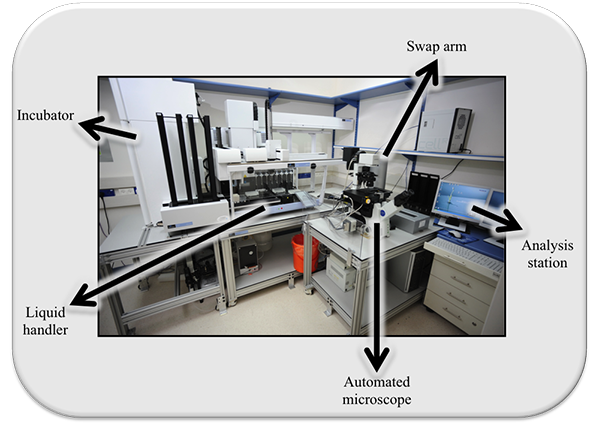This work was performed at Dr. Maya Schuldiner laboratory at the Weizmann institute of science. Our lab is interested in utilizing systematic approaches to achieve a detailed understanding of cellular physiology. For more information visit our home page: http://www.weizmann.ac.il/molgen/Maya/
In our lab we have set up a high content screening platform yielding high-resolution images of yeast for analysis (see below). The setup consists of a ScanR inverted epifluorescence microscope with an autofocus system and an automated stage (Olympus) coupled to a high-resolution, cooled, CCD camera with an extremely high quantum yield and small pixel size (necessary for good resolution within the very small yeast cell). Our microscope is connected via a robotic Hamilton SWAP arm to a Liquid handler. This setup allows us to visualize the sub cellular localization of a protein in more than 6000 different conditions or genetic backgrounds (equivalent to an entire yeast deletion library) in a couple of days while obtaining high-resolution images. Since this approach is fully automated we can collect single cell information on hundreds of cells per sample enabling population statistics or single cell analysis.

The platform we present here may be utilized to measure the proteome under a variety of stress conditions, life phases, genetic backgrounds and drug treatments. We aim for this data base to house all screens performed in our lab. We believe that such systems-wide, precise localization and quantitation directly at the protein level and at single cell resolution, opens up new avenues in the post-genomic era, which hold the promise to shed light on novel aspects of cell biology that have not been previously characterized.
Additional Reviews:
Rimon N. & Schuldiner M. (2011) Getting the whole picture: combining throughput with content in microscopy. Journal of Cell Science, DOI: 10.1242/jcs.087486. Pdf.
Cohen Y. & Schuldiner M. (2011) Advanced methods for high-throughput microscopy screening of genetically modified yeast libraries. Methods of Molecular Biology, DOI: 10.1007/978-1-61779-276-2_8. Pdf.
